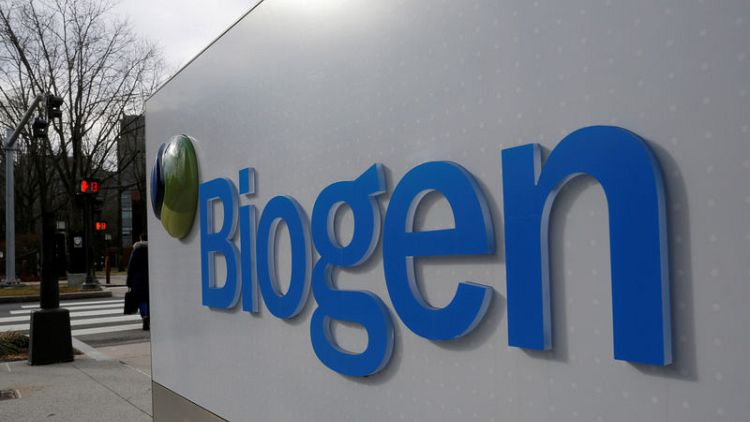By Manas Mishra and Trisha Roy
(Reuters) - Biogen Inc <BIIB.O> revived plans on Tuesday to seek U.S. approval for Alzheimer's treatment aducanumab, surprising investors and saying data from more patients in two discontinued studies showed the drug reduced the decline of patients.
The drugmaker's shares soared 27% in New York trading, recouping almost all of the $18 billion it lost when it said in March it was abandoning the two studies. Shares in Eisai Co <4523.T>, Biogen's Japanese partner in the drug, were quoted up 18% to the daily limit high of 6,534 yen in Tokyo trading.
The field of experimental Alzheimer's treatments is littered with high-profile failures, with many major drugmakers abandoning the race to develop a medicine for a disease that makes up 60%-70% of an estimated 50 million dementia cases globally.
Any medicine that effectively treats the disease is likely to become one of the world's top-selling drugs and could be transformative for Biogen, which is facing multiple challenges over its product pipeline.
Filing with U.S. regulators could "potentially bring back to life a drug that had been completely left for dead," RBC Capital Markets analyst Brian Abrahams wrote in a note.
"The viability of such a filing is unknown, given the mixed results - in our view, Biogen is somewhat desperate for growth drivers ... so a change in narrative is badly needed."
Biogen and Eisai decided to end the two late-stage trials of aducanumab in March when a so-called "futility analysis" revealed the trials had little hope of succeeding.
The failure spurred demands on Wall Street for the company to spend more on acquisitions, as its mainstay multiple-sclerosis franchise faced patent challenges and its newer muscle-wasting disorder treatment, Spinraza, faced competition from Switzerland's Novartis <NOVN.S>.
UPHILL BATTLE
Biogen said on Tuesday more data had become available after the two studies were discontinued, resulting in new analysis that showed one of the trials met the main goal, while the other did not.
Results from patients in the failed second trial who had received high doses also supported the findings of the first, it added. Patients who received aducanumab experienced significant benefits on measures of cognition and function such as memory, orientation and language.
Biogen said it had met with the Food and Drug Administration twice, once in June and again on Monday to discuss the data.
"They (FDA) thought it was reasonable for us to submit an application for approval," said Chief Medical Officer Alfred Sandrock, who earlier this month became the company's R&D head.
Credit Suisse analyst Fumiyoshi Sakai said the new datasets would be presented at clinical trials meetings in early December. FDA approval was not guaranteed, and investors and analysts would remain cautious "until we see a real product," he said.
The company said it planned to submit a marketing application for aducanumab in early 2020 based on the discussions.
Baird analyst Brian Skorney said he believed FDA approval for aducanumab was highly unlikely and predicted Biogen would have an uphill task to convince regulators that the results were more than random chance.
Aducanumab works on the hypothesis that removing deposits of amyloid, a type of plaque, from the brain of patients in the early stages of the disease could stave off its ravages, which include loss of memory and the inability to care for oneself.
Biogen executives on a conference call said the results from the new analysis were positive for another Alzheimer's drug, BAN2401, which works on a similar principal and is also being jointly developed along with Eisai.
The company also reported a better-than-expected third-quarter profit, helped by higher demand for rare muscle disease drug, Spinraza. (http://bit.ly/2N0C8ed)
Shares in the company, which had lost 25.7% of its value this year as of Monday's close, rose 27% to $284.
(Reporting by Ankur Banerjee, Manas Mishra and Trisha Roy in Bengaluru; Rocky Swift in Tokyo; Editing by Bernard Orr and Stephen Coates)



